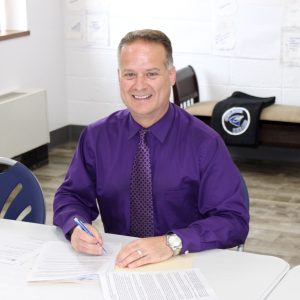
Located in Deering, Missouri, near the southernmost point of the state, the Delta C-7 School District is one of the smallest in Missouri. Dr. Ben Johnson doesn’t view Delta C-7’s small size or limited funding as disadvantages. To him, they are opportunities, chances to think creatively, form unexpected partnerships, and prove that rural schools can deliver big results. “I want these kids to have the same opportunities, the same aspects as everybody else. So that’s really been my focus… I’m keeping going and bringing unique experiences for our kids that they wouldn’t normally get.” Dr. Johnson stated.
Since stepping into the superintendent role in 2024, Dr. Johnson, who earned his EdD from the University of Missouri in 2015, has lived out that philosophy. In just nine months, he’s brought in more than $1.5 million in grant funding, secured a first-of-its-kind partnership with the Kansas City Royals, and created a culture where teachers and students alike feel seen and supported.
A Unique Path to Leadership
Dr. Johnson’s career path isn’t what you would typically expect. Rather than starting in education, Dr. Johnson first worked in law enforcement. “One of the positions I had in the police department was to go to schools,” he recalled. “Back then, DARE was in its infancy, and they were starting community policing to kind of bridge law enforcement and the community and the service aspect. I was one of the officers in charge of going to the schools. I started getting to spend a lot of time in the classrooms, a lot of time with teachers and students. I fell in love with the art of teaching, and just this aspect of education and student learning.” That experience planted a seed. Dr. Johnson began teaching classes on his own time, eventually leaving policing after six years to enter the classroom full-time.
In 2000, he took a job teaching middle school social studies. “I absolutely loved it, especially middle schoolers,” he said. “That transitional age is still my favorite group today.” From there, Dr. Johnson became a building principal and continued his own studies earning a master’s, specialist, and doctorate before stepping into district leadership as a superintendent. “It’s the perfect job,” he said. “Because now I get to do everything. Being in the classrooms is still very much a part of my every day weekly schedule. I still get the building principal aspect of it, interacting with the students and community members, and then the added layer of being a superintendent. So you kind of get to do everything that you want to do, all kind of wrapped up in one package.”
Turning Grants Into Opportunity
For Dr. Johnson, grants have become transformative at Delta C-7. But to him, it’s not just about dollars. Grants are the mechanism through which he reimagines what is possible for students who might otherwise go without.
Dr. Johnson keeps what he calls a “wish list,” a running document of every need he sees across the district: facilities, safety, technology, and programs. “I stare at it every day,” he said. “If you don’t have something in front of you, it just goes away. But with that list, I can say, ‘What’s next? Who can I talk to?’”
Dr. Johnson still recalls his first grant ever received at Delta C-7, a grant for folders, notebooks, and highlighters so teachers wouldn’t have to spend their own money. “That kind of started the game,” Dr. Johnson said. Since then, he has chased down opportunities large and small, often through persistence and networking. “The funny thing about grants is there are so many out there, but they’re hard to find,” he said. “You can’t just Google a list. You have to turn over every stone, reach out to people, and build contacts.”
That mindset has paid off. The funding has added new instruments to the band program, enhanced safety infrastructure, and opened doors to learning resources in a community where funds are often scarce. Dr. Johnson is now working on a grant to replace aging roofs, an opportunity that didn’t even exist on paper before he reached out. “It wasn’t even created. It came through contacts,” Dr. Johnson explained. “All it costs is your time.”
A Royals Partnership With Big-League Impact

Perhaps the boldest example of Dr. Johnson’s “why not ask?” approach came when he reached out to the Kansas City Royals. With no connections to the organization, he sent a proposal outlining Delta C-7’s needs: facilities and equipment improvements and opportunities for students who had never experienced a live professional baseball game. “I thought, I’ll swing for the fences. All they can do is say no,” Dr. Johnson said. “Lo and behold, they responded tenfold.”
The Royals offered more than words of support. They organized a two-day summer clinic for local children, ages 5 to 13, led by Royals coaches, staff, and players at no cost to the Delta C-7 students. Over 100 kids from the community showed up, many experiencing hands-on instruction for the first time. “The kids had a blast. They were loving it,” Dr. Johnson said. Through this partnership, another organization reached out to improve Delta C-7’s baseball and softball fields in ways such as new grass and fences, an investment that would leave a lasting mark on the district’s facilities and culture.
Dr. Johnson’s colleague Kelly Wilkerson-Dullenty, described the collaboration as “the very first of its kind in Missouri,” and a model for how rural districts can form unlikely but transformative partnerships.
Meeting Students’ Basic Needs
Beyond grants and big partnerships, Dr. Johnson’s priorities are grounded in the basics: making sure students have what they need every day. “I wanted three free meals a day for all kids, no one should have to worry about eating or lunch money,” he said. By leveraging state food service programs, Delta C-7 now provides breakfast, lunch, and an afternoon meal to every student.
The impact was immediate. “Before, a lot of kids weren’t eating. Now, our food consumption is through the roof, and waste is almost gone,” Dr. Johnson said. “When you take money out of the equation, kids relax and eat. They try new things. And once they’re fed, you can really dive into academics.”
He also partnered with FCC Behavioral Health to bring counseling services directly into the school. By converting unused classrooms into welcoming spaces, the district now hosts mental health professionals on campus twice a week. Families who once drove long distances for services now have access on their school’s campus.
Leading From the Front
Dr. Johnson’s leadership style is rooted in presence. He rolls up his sleeves, and isn’t afraid to ask for feedback. “When you share your ideas openly, your staff makes them a thousand times better,” he said. “I tell them all the time, you make me look way better than I really am and that’s when you know you’ve got a great team.”
Enrollment has already risen eight percent since his arrival, a sign that families believe in the district’s direction. For Dr. Johnson, seeing enrollment rise and grants helping to improve schools and the student experience keeps him motivated. “When you see something that you’ve maybe implemented or worked for, and then you’re seeing it in action whether it be, ‘hey, we got new textbooks, or new art supplies’, or when those, new music instruments came, seeing them play a little concert for a couple of retirement communities next door.. that’s addictive,” he said, “It’s just like the parent back in the days when you just kind of sit back with your cup of coffee and watch your little kids open their presents, and then just the reactions that they’re getting it’s kind of like that on a grander scale. So if that doesn’t keep anyone going, I don’t know what it does, because it’s a wonderful feeling. That’s the motivation to just want to keep going is just those reactions.”
Dr. Johnson encourages others who are interested in seeking grant funding to be proactive, “They’re not going to come to you. You gotta go and make those contacts… Just communicate out there and say we’re a great school, here’s a list of our needs right now or our wish list of things that we would like to have to improve the lives of our community and our schools. Can anybody help us?” And he always comes back to the same principle: time is the most valuable tool a leader has. “Really, all it takes is time,” Dr. Johnson said. “It does come down to that first step, and you’d be amazed at the response that you’ll get back.”